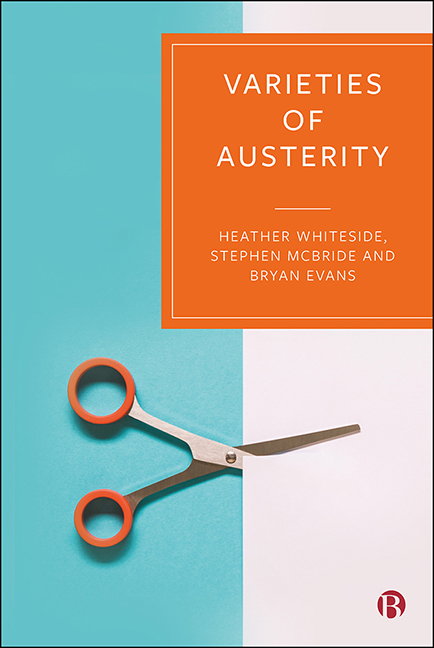Book contents
- Frontmatter
- Contents
- List of Figures and Tables
- About the Authors
- Acknowledgements
- 1 Introduction: Varieties of Austerity
- 2 Spending in an Austere Era
- 3 Selling Restraint
- 4 Transforming the Public Sector
- 5 Class Struggle from Above
- 6 Insecurity and Poverty
- 7 Limits and Possibilities of Resistance
- 8 Conclusion: Beyond Austerity
- Notes
- References
- Index
6 - Insecurity and Poverty
Published online by Cambridge University Press: 04 January 2022
- Frontmatter
- Contents
- List of Figures and Tables
- About the Authors
- Acknowledgements
- 1 Introduction: Varieties of Austerity
- 2 Spending in an Austere Era
- 3 Selling Restraint
- 4 Transforming the Public Sector
- 5 Class Struggle from Above
- 6 Insecurity and Poverty
- 7 Limits and Possibilities of Resistance
- 8 Conclusion: Beyond Austerity
- Notes
- References
- Index
Summary
The neoliberal era has been one of increased inequality in both income and wealth distribution. The trend started in the 1970s in the US and has been most dramatic in the North Atlantic world but is also apparent in most of Europe. An OECD report (2017) noted that income inequality in Europe had grown over several decades. In Canada, gains in income were similarly concentrated at the top of the spectrum. Between 1982 and 2015, ‘The average real pre-tax income of the top 1 per cent of tax filers more than doubled, increasing by $320,000 – but the bottom 50 per cent of tax filers did not even keep up with inflation – their real income fell by an average of $1,546’ (Osberg, 2017: 28).
More generally, various scholars have made the case that the neoliberal period has been characterized by the rapid growth of transnational firms and finance, and the ongoing transfer of income and wealth to the wealthy few (see Piketty, 2014; Atkinson, 2015; Peters, 2020). As Faroohar (2016: 15) summarizes, ‘the share of financiers within the top 1 per cent of the income distribution nearly doubled between 1979 and 2005’. By this calculation, an unprecedented level of inequality was already in place when the crisis struck. While income inequality earned through bonuses, super-salaries and a dismantling of progressive income tax systems is one part of the story, wealth (and finance) is particularly implicated because, again quoting Faroohar (2016: 15):
[e]ven when you consider the salaries of the modern economy's supermanagers – the CEOs, bankers, accountants, agents, consultants, and lawyers that groups like Occupy Wall Street rail against – it's important to remember that somewhere between 30 and 80 percent of their income is awarded not in cash but in incentive stock options and stock shares.
This type of income often escapes even quasi-progressive payroll-based income tax systems. Thus, in the US, ‘the top twenty-five hedge fund managers in America make more than all the country's kindergarten teachers combined’ (Faroohar, 2016: 15–16).
Austerity itself is not the whole cause of inequality. Processes of financialization and wealth inequality began well before the 2008 crisis and subsequent austerity measures.
- Type
- Chapter
- Information
- Varieties of Austerity , pp. 135 - 156Publisher: Bristol University PressPrint publication year: 2021



